北师大版高中英语必修一 Unit 2 Heroes过去时和现在完成时
文档属性
| 名称 | 北师大版高中英语必修一 Unit 2 Heroes过去时和现在完成时 |
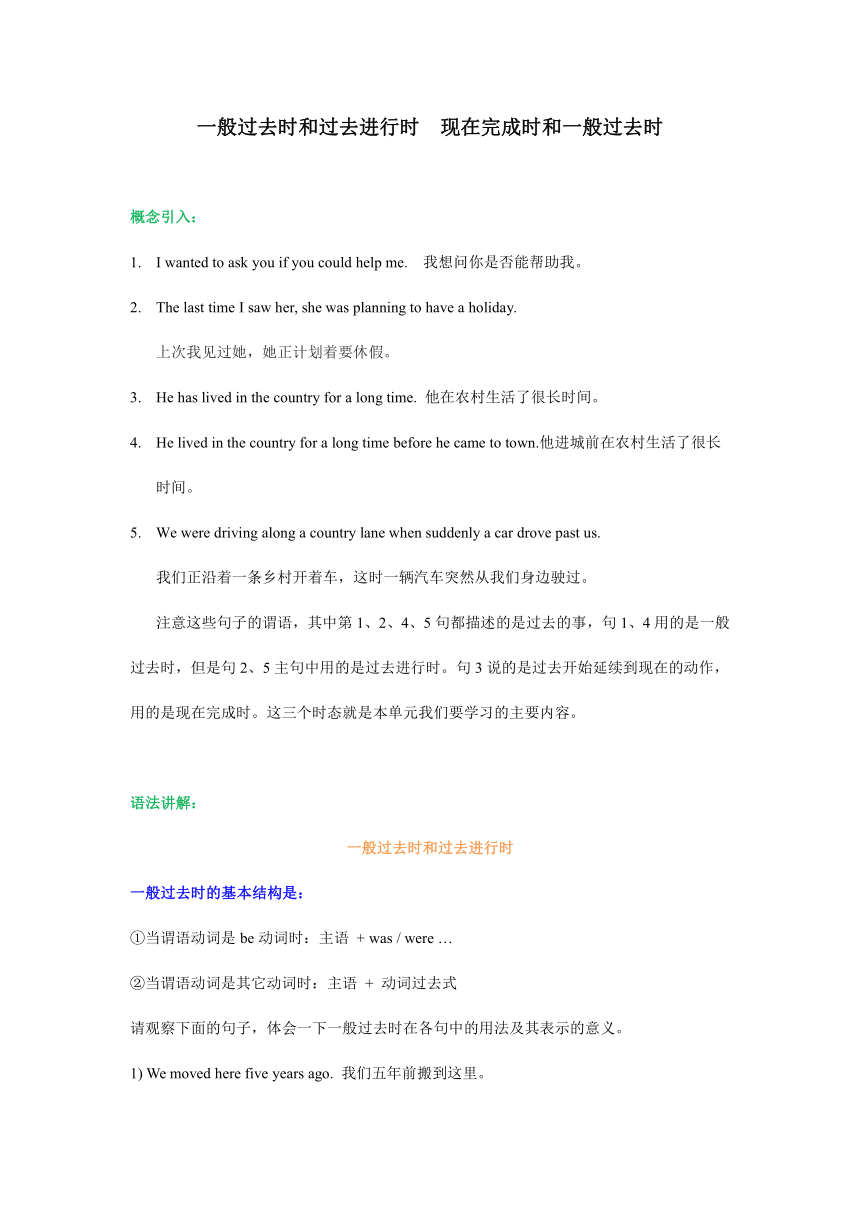
|
|
| 格式 | zip | ||
| 文件大小 | 32.0KB | ||
| 资源类型 | 教案 | ||
| 版本资源 | 北师大版 | ||
| 科目 | 英语 | ||
| 更新时间 | 2019-11-05 00:00:00 | ||
图片预览

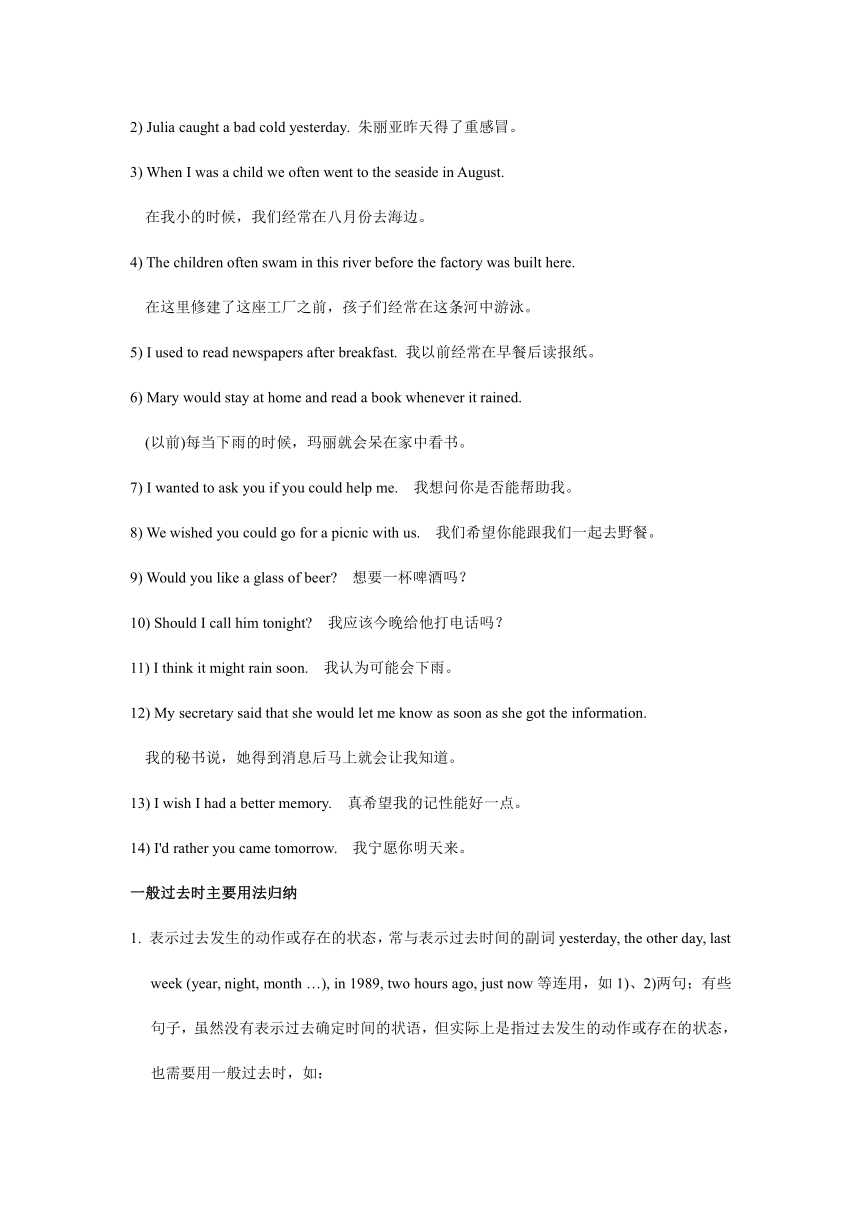
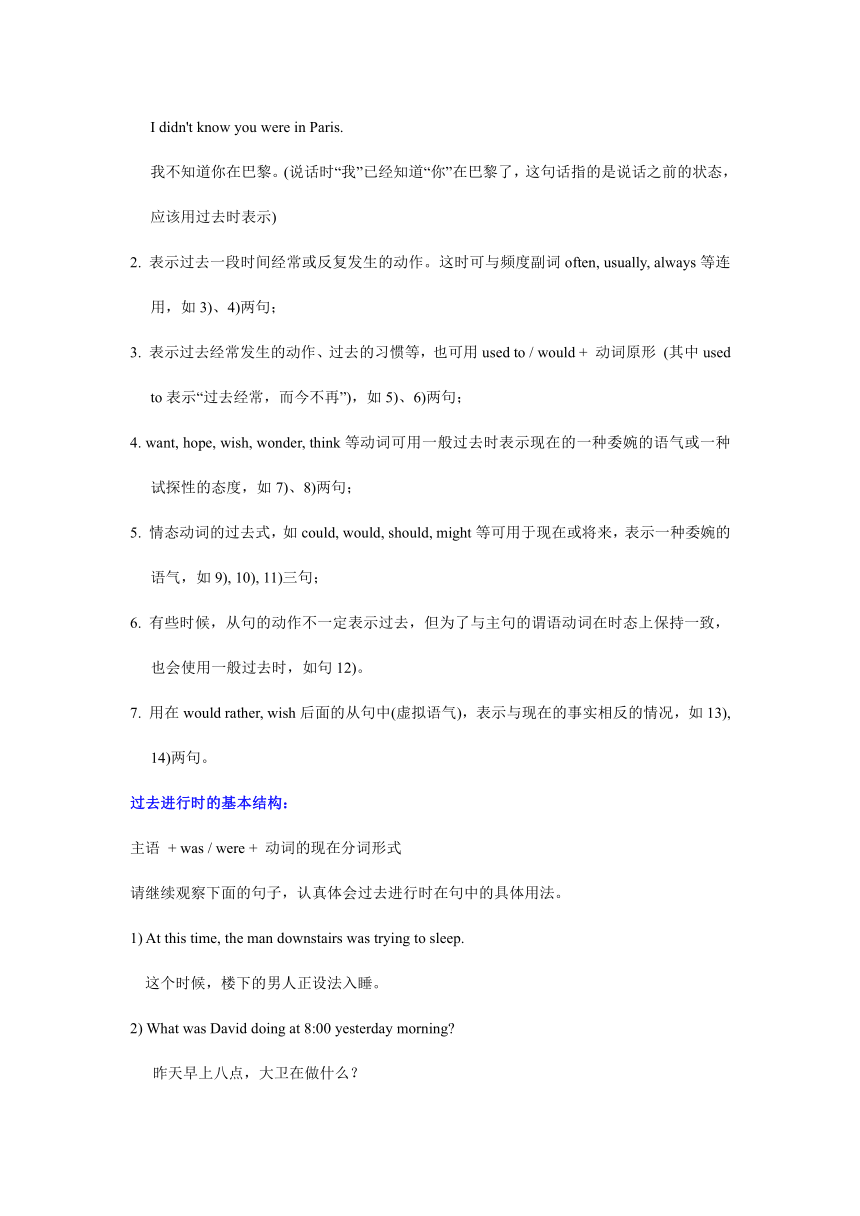
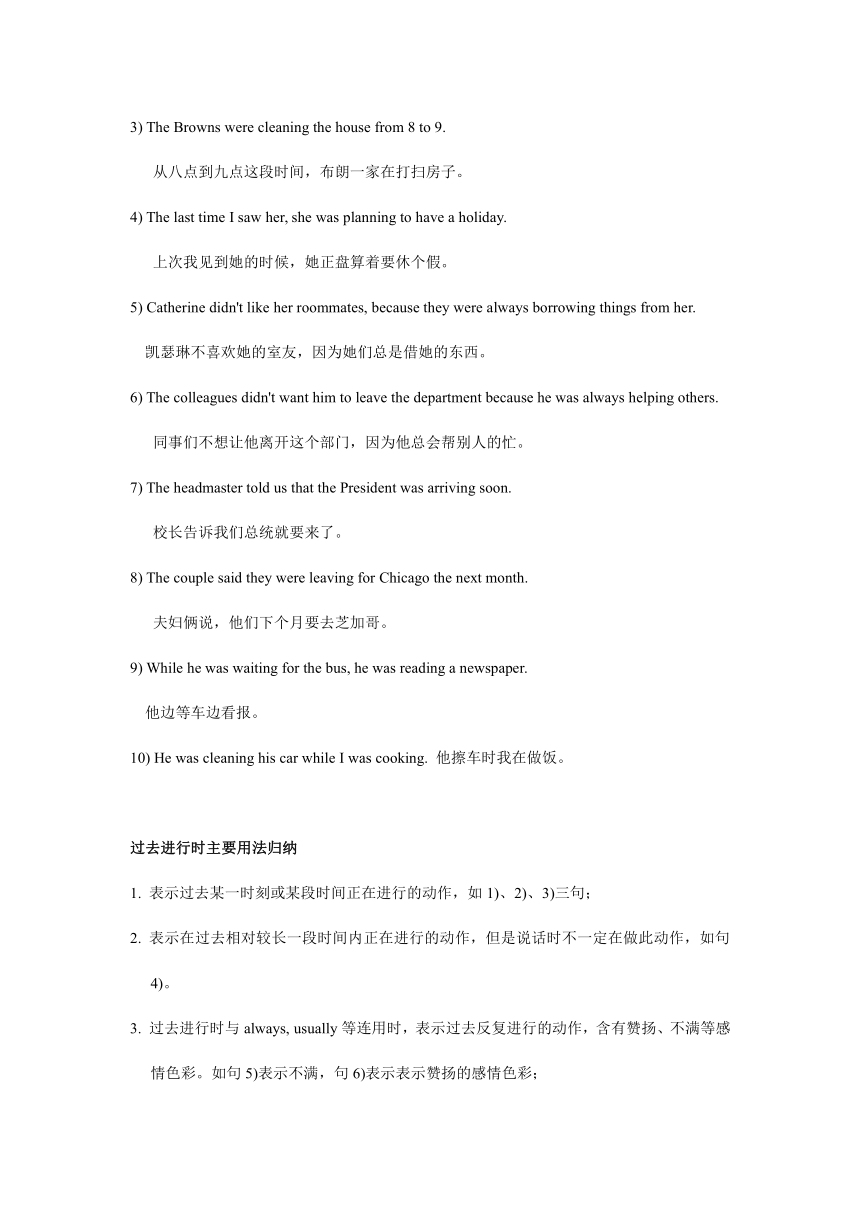
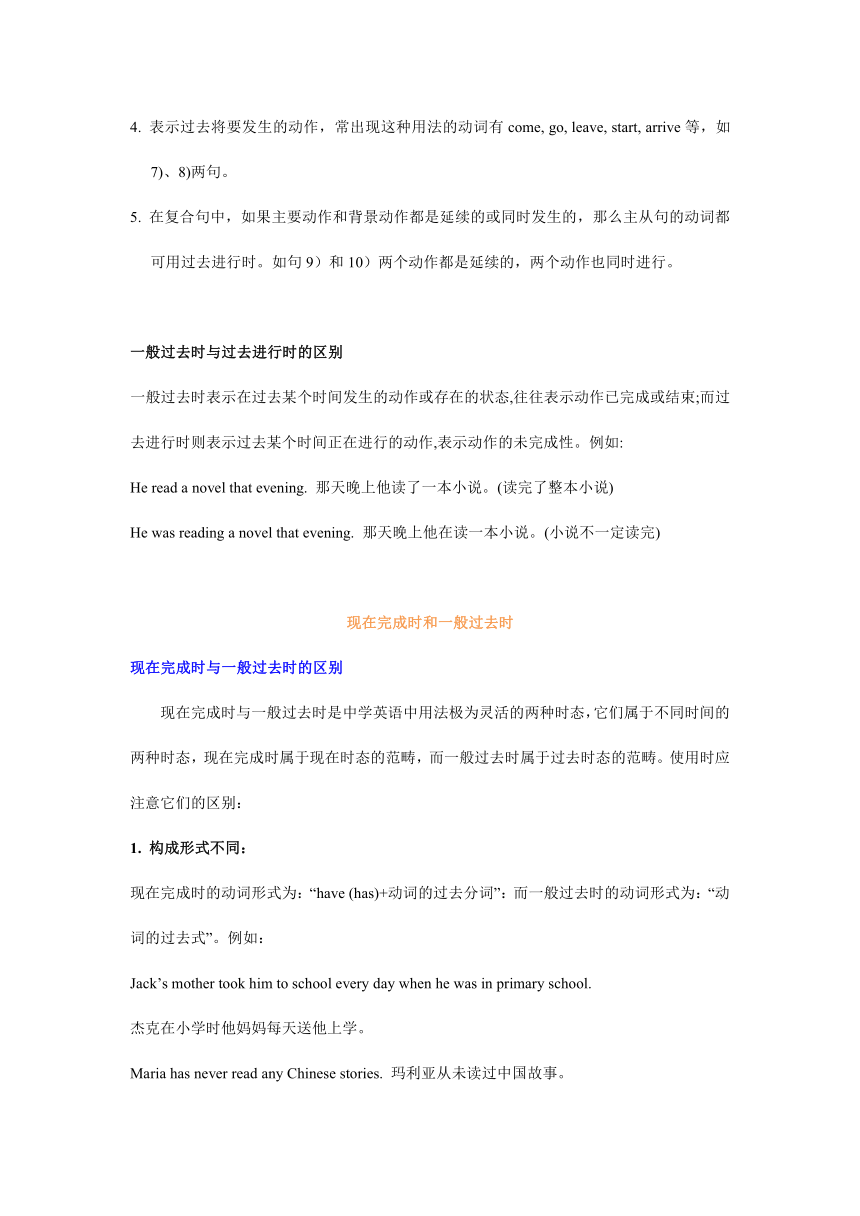
文档简介
一般过去时和过去进行时 现在完成时和一般过去时
概念引入:
I wanted to ask you if you could help me. 我想问你是否能帮助我。
The last time I saw her, she was planning to have a holiday. 上次我见过她,她正计划着要休假。
He has lived in the country for a long time. 他在农村生活了很长时间。
He lived in the country for a long time before he came to town.他进城前在农村生活了很长时间。
We were driving along a country lane when suddenly a car drove past us.
我们正沿着一条乡村开着车,这时一辆汽车突然从我们身边驶过。
注意这些句子的谓语,其中第1、2、4、5句都描述的是过去的事,句1、4用的是一般过去时,但是句2、5主句中用的是过去进行时。句3说的是过去开始延续到现在的动作,用的是现在完成时。这三个时态就是本单元我们要学习的主要内容。
语法讲解:
一般过去时和过去进行时
一般过去时的基本结构是:
①当谓语动词是be动词时:主语 + was / were …
②当谓语动词是其它动词时:主语 + 动词过去式
请观察下面的句子,体会一下一般过去时在各句中的用法及其表示的意义。
1) We moved here five years ago. 我们五年前搬到这里。
2) Julia caught a bad cold yesterday. 朱丽亚昨天得了重感冒。
3) When I was a child we often went to the seaside in August.
在我小的时候,我们经常在八月份去海边。
4) The children often swam in this river before the factory was built here.
在这里修建了这座工厂之前,孩子们经常在这条河中游泳。
5) I used to read newspapers after breakfast. 我以前经常在早餐后读报纸。
6) Mary would stay at home and read a book whenever it rained.
(以前)每当下雨的时候,玛丽就会呆在家中看书。
7) I wanted to ask you if you could help me. 我想问你是否能帮助我。
8) We wished you could go for a picnic with us. 我们希望你能跟我们一起去野餐。
9) Would you like a glass of beer? 想要一杯啤酒吗?
10) Should I call him tonight? 我应该今晚给他打电话吗?
11) I think it might rain soon. 我认为可能会下雨。
12) My secretary said that she would let me know as soon as she got the information.
我的秘书说,她得到消息后马上就会让我知道。
13) I wish I had a better memory. 真希望我的记性能好一点。
14) I'd rather you came tomorrow. 我宁愿你明天来。
一般过去时主要用法归纳
1. 表示过去发生的动作或存在的状态,常与表示过去时间的副词yesterday, the other day, last week (year, night, month …), in 1989, two hours ago, just now等连用,如1)、2)两句;有些句子,虽然没有表示过去确定时间的状语,但实际上是指过去发生的动作或存在的状态,也需要用一般过去时,如:
I didn't know you were in Paris.
我不知道你在巴黎。(说话时“我”已经知道“你”在巴黎了,这句话指的是说话之前的状态,应该用过去时表示)
2. 表示过去一段时间经常或反复发生的动作。这时可与频度副词often, usually, always等连用,如3)、4)两句;
3. 表示过去经常发生的动作、过去的习惯等,也可用used to / would + 动词原形 (其中used to表示“过去经常,而今不再”),如5)、6)两句;
4. want, hope, wish, wonder, think等动词可用一般过去时表示现在的一种委婉的语气或一种试探性的态度,如7)、8)两句;
5. 情态动词的过去式,如could, would, should, might等可用于现在或将来,表示一种委婉的语气,如9), 10), 11)三句;
6. 有些时候,从句的动作不一定表示过去,但为了与主句的谓语动词在时态上保持一致,也会使用一般过去时,如句12)。
7. 用在would rather, wish后面的从句中(虚拟语气),表示与现在的事实相反的情况,如13), 14)两句。
过去进行时的基本结构:
主语 + was / were + 动词的现在分词形式
请继续观察下面的句子,认真体会过去进行时在句中的具体用法。
1) At this time, the man downstairs was trying to sleep.
这个时候,楼下的男人正设法入睡。
2) What was David doing at 8:00 yesterday morning?
昨天早上八点,大卫在做什么?
3) The Browns were cleaning the house from 8 to 9.
从八点到九点这段时间,布朗一家在打扫房子。
4) The last time I saw her, she was planning to have a holiday.
上次我见到她的时候,她正盘算着要休个假。
5) Catherine didn't like her roommates, because they were always borrowing things from her.
凯瑟琳不喜欢她的室友,因为她们总是借她的东西。
6) The colleagues didn't want him to leave the department because he was always helping others.
同事们不想让他离开这个部门,因为他总会帮别人的忙。
7) The headmaster told us that the President was arriving soon.
校长告诉我们总统就要来了。
8) The couple said they were leaving for Chicago the next month.
夫妇俩说,他们下个月要去芝加哥。
9) While he was waiting for the bus, he was reading a newspaper.
他边等车边看报。
10) He was cleaning his car while I was cooking. 他擦车时我在做饭。
过去进行时主要用法归纳
1. 表示过去某一时刻或某段时间正在进行的动作,如1)、2)、3)三句;
2. 表示在过去相对较长一段时间内正在进行的动作,但是说话时不一定在做此动作,如句4)。
3. 过去进行时与always, usually等连用时,表示过去反复进行的动作,含有赞扬、不满等感彩。如句5)表示不满,句6)表示表示赞扬的感彩;
4. 表示过去将要发生的动作,常出现这种用法的动词有come, go, leave, start, arrive等,如7)、8)两句。
5. 在复合句中,如果主要动作和背景动作都是延续的或同时发生的,那么主从句的动词都可用过去进行时。如句9)和10)两个动作都是延续的,两个动作也同时进行。
一般过去时与过去进行时的区别
一般过去时表示在过去某个时间发生的动作或存在的状态,往往表示动作已完成或结束;而过去进行时则表示过去某个时间正在进行的动作,表示动作的未完成性。例如:
He read a novel that evening. 那天晚上他读了一本小说。(读完了整本小说)
He was reading a novel that evening. 那天晚上他在读一本小说。(小说不一定读完)
现在完成时和一般过去时
现在完成时与一般过去时的区别
现在完成时与一般过去时是中学英语中用法极为灵活的两种时态,它们属于不同时间的两种时态,现在完成时属于现在时态的范畴,而一般过去时属于过去时态的范畴。使用时应注意它们的区别:
1. 构成形式不同:
现在完成时的动词形式为:“have (has)+动词的过去分词”:而一般过去时的动词形式为:“动词的过去式”。例如:
Jack’s mother took him to school every day when he was in primary school.
杰克在小学时他妈妈每天送他上学。
Maria has never read any Chinese stories. 玛利亚从未读过中国故事。
2. 基本用法不同:
(1)正如前面所说,现在完成时是与现在有关的时态,属现在时态的范畴,它侧重于过去的动作对现在造成的影响;而一般过去时是一种过去时态,侧重于表示过去的动作,与现在无关。例如:
Yesterday I went to the zoo.昨天我去了动物园。(仅说明昨天去了动物园,与现在无关)
Li Lei has read the book. 李磊已看过那本书。(说明李磊了解那本书的内容)
(2)现在完成时还可以表示动作从过去某个时候开始一直延续到现在,强调动作的延续性它常与for及since引导的一段时间状语连用。例如:
He has lived here for ten years. 他已在这儿住了10年了。
It’s been a month since I came to this new school… (2019 四川模拟)
从我来到这个新学校已经一个月了。
比较:
1) The Greens have worked in China since 1998.
格林一家自1998年到现在一直在中国工作。
The Greens worked in China in 1998.格林一家1998年在中国工作。
2) He has lived in the country for a long time. 他在农村生活了很长时间。(现在还在农村)
He lived in the country for a long time before he came to town.
他进城前在农村生活了很长时间。
3) She has bought a bicycle.她买了一辆自行车。(现在她有一辆自行车了。)
She bought a bicycle last year.去年她买了一辆自行车。
4) He has won a prize for his invention. 他因为他的发明而获奖了。
He also won a prize last year. 他去年也获奖了。
注意:在与for及since引导的一段时间状语连用时,句子的谓语动词必须是延续性动词,终止性动词不可和一段时间连用。例如:他当兵已三年了。
误:He has become a soldier for three years.
误:He joined the army for three years.
正:He has been a soldier for three years.
正:He has been in the army for three years.
3. 连用的时间状语不同
与现在完成时连用的时间状语除了上面所说明的由since和for引导的一段时间外还有:already, yet, still ,just, so far, in the last(past), before, ever, never等。而一般过去时则常与ago, yesterday, last, in 2000, just now等连用。
注意:现在完成时态不可与yesterday, last week, two days ago等之类的表示具体的过去时间的状语连用。例如:
Have you ever picked flowers or stepped on the grass in the park?
你曾在公园里摘过花或曾踩过草地吗?
Father bought that watch ten years ago.爸爸10年前买了那块手表。
I have never seen the film before. 我以前没有看过这部影片。
注意:在when引导的特殊疑问句中不可用现在完成时,而只可用一般过去时。
例如:When did you visit Japan? 你什么时候访问过日本?
4. 使用的目的不同
(1)现在完成时经常用于总结。
(2)一般过去时常描述过去发生的事,与现在没有关系。
They played jazz music to celebrate their new home. (2019 北京模拟)
他们弹奏了爵士乐来庆祝他们的新家。(描述过去发生的一件事)
This is the second time I have been here.
这是我第二次来这里。(总结从过去开始一直到现在的情况)
---What do you think of her singing? 你认为她唱得怎么样?
---It’s wonderful. I haven’t heard a better voice before.
很精彩。我以前还没有听过这么好的嗓音。
巩固练习
完成句子
1.I (从未听说过) it before.
2.— (你挤牛奶了吗)?
— Yes. I have done that already.
3.Oh dear! I (没见到你) for several years.
4.What (发生) to Zhouqu in the last month?
5.I’ll help you when I (完成) my paper.
6.If it (雪停了), I’ll go to the park.
7.He (买这本书) for a week.
8.It is the second time that I (犯这种错误).
9.It’s a week since he (生病).
10.John (工作) for 10 years.
单项填空
1.When I was at college, I ________ three foreign languages, but I ________ all except a few words of each.
A.spoke; had forgotten B.spoke; have forgotten
C.had spoken; had forgotten D.had spoken; have forgotten
2.— Where is the key to the meeting room?
— Dear me! I ________ it in the taxi!
A.have left B.leave C.had left D.leaving
3.According to the report, the number of people out of work ________ by 10% in the past two years.
A.was increased B.were increased C.have increased D.has increased
4.We ________ each other ever since we graduated from high school in the 1990s.
A.didn’t see B.wouldn’t see C.haven’t seen D.hadn’t seen
5.— How are you today?
— Oh, I ________ as ill as I do now for a very long time.
A.didn’t feel B.wasn’t feeling C.don’t feel D.haven’t felt
6.— How long have you known Christopher?
— Since he ________ to our company.
A.came B.has come C.was coming D.comes
7.— When shall we restart our business?
— Not until we ________ our plan.
A.will finish B.are finishing C.are to finish D.have finished
8.For many years, people ________ electric cars. However, making them has been more difficult than predicted.
A.had dreamed of B.have dreamed of C.dreamed of D.dream of
9.Progress ________ so far very good and we are sure that the work will be finished on time.
A.was B.had been C.has been D.will be
10.This is the first time we ________ a film in the cinema together as a family.
A.see B.had seen C.saw D.have seen
11. A terrible earthquake ________, however, occur the other day in Wenchuan.
A.does B.did C.has done D.had done
12. —Who do you think ________ the book here?
—It may be John. He was sitting here all the morning.
A.was leaving B.leaves C.had left D.has left
13. —Sorry to have interrupted you. Please go on.
—Where was I?
—You ________ you didn’t like your father’s job.
A.had said B.said C.were saying D.had been saying
14. I don’t smoke now, but I ________for almost ten years.
A.ever smoked B.have ever smoked C.had ever smoked D.was ever smoking
15. —Mom, have you washed my clothes?
—No. I’m busy, but I ________them for you now.
A.wash B.am washing C.will wash D.would wash
16. —Is Peter coming? (2019 重庆模拟)
—No, he ________ his mind after a phone call at the last minute.
A. changes B. changed C. was changing D. had changed
17. -I called you last night, but nobody answered it. (2019 北京西城期末)
-Oh, I __________ my friend at the station.
A. met B. was meeting C. have met D. would meet
18. She _________ to her parents since she left home last month.
A. hasn’t written B. didn’t write C. doesn’t write D. wasn’t writing
19. —Your spoken English is so good.Have you been abroad? (2019西安八校联考)
—Yes.I ________ in America for three years.
A.will stay B.stayed C.had stayed D.have been staying
20. —Has Sam finished his homework today?
—I have no idea. He ____ it this morning.
A. did B. has done C. was doing D. had done
答案解析:
完成句子
1. have never heard of 2. Have you milked the cow
3. haven’t seen you 4. has happened
5. have finished 6. has stopped snowing
7. has had the book 8. have made the mistake
9. fell ill 10. has worked/has been working
单项填空
1.B。句意:我在大学里会说三种外语,但是现在只记得每种外语中的几个单词了。上大学时是过去的一段时间,所以第一空用过去时spoke;而忘记这一动作发生在到目前为止的时间段内,故用现在完成时。
2.A。根据语境可知,钥匙不在答话者手中,而是忘在出租车上了,因此用现在完成时表示过去发生的动作对现在的影响——门打不开了。
3.D。 “the number of+复数名词”作主语时,谓语动词用单数形式;又“in the past+一段时间”与现在完成时连用,故选D项。
4.C。句意:我们自从90年代高中毕业后就再也没见过对方。ever since引导的时间状语从句常与现在完成时连用。
5.D。答语句意:哦,很长一段时间以来我没有像现在这样难受了。for a very long time是重要的判断依据。
6.A 。since意为“自从……”,引导时间状语从句,从句中常用一般过去时,主句中用现在完成时。
7.D。在时间状语从句中,如果表示将来发生的动作时,常用一般时态代替,但在表示完成的动作时,可以用完成时态。故选D项。
8.B。由时间状语“for+时间段” 可知,应用现在完成时。
9.C。句意:到目前为止,进展很顺利,我们相信工作会按时完成。so far表示“到目前为止”,常与现在完成时连用。
10.D。在“This is the first time (that) ...”句型中,从句常用现在完成时。
11. B。时间状语the other day表示过去,要用一般过去时。此处用did 对谓语动词进行强调。
12. D。句意:——你认为谁把书落在这里了?——可能是约翰。他一上午都坐在这里。强调过去发生的动作对现在造成的影响或结果,应该用现在完成时。
13. C。对话中,其中一个人打断了另一个人的话,因此第二个人问“我说到哪儿了?”,回答应是“你(刚才正说)你不喜欢你父亲的工作”,应用过去进行时态。
14. A。句意:我现在不抽烟,但是我曾抽烟将近十年。句意表示现在不抽烟,因此曾抽烟是与现在没有任何关联的过去动作,用一般过去时。
15. C。因为忙,妈妈尚未给孩子洗衣服,但是妈妈说她马上就开始洗,因此应用一般将来时。妈妈是由于孩子的询问而临时决定洗衣服的,不是计划安排,排除B。
16. B。句子大意:Peter不来了,他是在最后一分钟一个电话后改变的主意。at the last minute是过去时间,所以用一般过去时。故B正确。
17. B。昨晚第一个人打电话时第二个人正在火车站和朋友见面,用过去进行时。
18. A。由since从句可知,句子表示从过去某时开始一直到现在,要用现在完成时。
19. B。句意:---您的英语口语那么好。您在国外呆过?---是的。我在美国呆了三年。根据语境在美国呆的动作应该发生在过去,因为说话的人已经回来。应用一般过去时。故选B。
20. C。第二个人不知道山姆是否完成了今天的作业,但是看见了他上午一直在做作业。过去一段时间在做的事,用过去进行时。
概念引入:
I wanted to ask you if you could help me. 我想问你是否能帮助我。
The last time I saw her, she was planning to have a holiday. 上次我见过她,她正计划着要休假。
He has lived in the country for a long time. 他在农村生活了很长时间。
He lived in the country for a long time before he came to town.他进城前在农村生活了很长时间。
We were driving along a country lane when suddenly a car drove past us.
我们正沿着一条乡村开着车,这时一辆汽车突然从我们身边驶过。
注意这些句子的谓语,其中第1、2、4、5句都描述的是过去的事,句1、4用的是一般过去时,但是句2、5主句中用的是过去进行时。句3说的是过去开始延续到现在的动作,用的是现在完成时。这三个时态就是本单元我们要学习的主要内容。
语法讲解:
一般过去时和过去进行时
一般过去时的基本结构是:
①当谓语动词是be动词时:主语 + was / were …
②当谓语动词是其它动词时:主语 + 动词过去式
请观察下面的句子,体会一下一般过去时在各句中的用法及其表示的意义。
1) We moved here five years ago. 我们五年前搬到这里。
2) Julia caught a bad cold yesterday. 朱丽亚昨天得了重感冒。
3) When I was a child we often went to the seaside in August.
在我小的时候,我们经常在八月份去海边。
4) The children often swam in this river before the factory was built here.
在这里修建了这座工厂之前,孩子们经常在这条河中游泳。
5) I used to read newspapers after breakfast. 我以前经常在早餐后读报纸。
6) Mary would stay at home and read a book whenever it rained.
(以前)每当下雨的时候,玛丽就会呆在家中看书。
7) I wanted to ask you if you could help me. 我想问你是否能帮助我。
8) We wished you could go for a picnic with us. 我们希望你能跟我们一起去野餐。
9) Would you like a glass of beer? 想要一杯啤酒吗?
10) Should I call him tonight? 我应该今晚给他打电话吗?
11) I think it might rain soon. 我认为可能会下雨。
12) My secretary said that she would let me know as soon as she got the information.
我的秘书说,她得到消息后马上就会让我知道。
13) I wish I had a better memory. 真希望我的记性能好一点。
14) I'd rather you came tomorrow. 我宁愿你明天来。
一般过去时主要用法归纳
1. 表示过去发生的动作或存在的状态,常与表示过去时间的副词yesterday, the other day, last week (year, night, month …), in 1989, two hours ago, just now等连用,如1)、2)两句;有些句子,虽然没有表示过去确定时间的状语,但实际上是指过去发生的动作或存在的状态,也需要用一般过去时,如:
I didn't know you were in Paris.
我不知道你在巴黎。(说话时“我”已经知道“你”在巴黎了,这句话指的是说话之前的状态,应该用过去时表示)
2. 表示过去一段时间经常或反复发生的动作。这时可与频度副词often, usually, always等连用,如3)、4)两句;
3. 表示过去经常发生的动作、过去的习惯等,也可用used to / would + 动词原形 (其中used to表示“过去经常,而今不再”),如5)、6)两句;
4. want, hope, wish, wonder, think等动词可用一般过去时表示现在的一种委婉的语气或一种试探性的态度,如7)、8)两句;
5. 情态动词的过去式,如could, would, should, might等可用于现在或将来,表示一种委婉的语气,如9), 10), 11)三句;
6. 有些时候,从句的动作不一定表示过去,但为了与主句的谓语动词在时态上保持一致,也会使用一般过去时,如句12)。
7. 用在would rather, wish后面的从句中(虚拟语气),表示与现在的事实相反的情况,如13), 14)两句。
过去进行时的基本结构:
主语 + was / were + 动词的现在分词形式
请继续观察下面的句子,认真体会过去进行时在句中的具体用法。
1) At this time, the man downstairs was trying to sleep.
这个时候,楼下的男人正设法入睡。
2) What was David doing at 8:00 yesterday morning?
昨天早上八点,大卫在做什么?
3) The Browns were cleaning the house from 8 to 9.
从八点到九点这段时间,布朗一家在打扫房子。
4) The last time I saw her, she was planning to have a holiday.
上次我见到她的时候,她正盘算着要休个假。
5) Catherine didn't like her roommates, because they were always borrowing things from her.
凯瑟琳不喜欢她的室友,因为她们总是借她的东西。
6) The colleagues didn't want him to leave the department because he was always helping others.
同事们不想让他离开这个部门,因为他总会帮别人的忙。
7) The headmaster told us that the President was arriving soon.
校长告诉我们总统就要来了。
8) The couple said they were leaving for Chicago the next month.
夫妇俩说,他们下个月要去芝加哥。
9) While he was waiting for the bus, he was reading a newspaper.
他边等车边看报。
10) He was cleaning his car while I was cooking. 他擦车时我在做饭。
过去进行时主要用法归纳
1. 表示过去某一时刻或某段时间正在进行的动作,如1)、2)、3)三句;
2. 表示在过去相对较长一段时间内正在进行的动作,但是说话时不一定在做此动作,如句4)。
3. 过去进行时与always, usually等连用时,表示过去反复进行的动作,含有赞扬、不满等感彩。如句5)表示不满,句6)表示表示赞扬的感彩;
4. 表示过去将要发生的动作,常出现这种用法的动词有come, go, leave, start, arrive等,如7)、8)两句。
5. 在复合句中,如果主要动作和背景动作都是延续的或同时发生的,那么主从句的动词都可用过去进行时。如句9)和10)两个动作都是延续的,两个动作也同时进行。
一般过去时与过去进行时的区别
一般过去时表示在过去某个时间发生的动作或存在的状态,往往表示动作已完成或结束;而过去进行时则表示过去某个时间正在进行的动作,表示动作的未完成性。例如:
He read a novel that evening. 那天晚上他读了一本小说。(读完了整本小说)
He was reading a novel that evening. 那天晚上他在读一本小说。(小说不一定读完)
现在完成时和一般过去时
现在完成时与一般过去时的区别
现在完成时与一般过去时是中学英语中用法极为灵活的两种时态,它们属于不同时间的两种时态,现在完成时属于现在时态的范畴,而一般过去时属于过去时态的范畴。使用时应注意它们的区别:
1. 构成形式不同:
现在完成时的动词形式为:“have (has)+动词的过去分词”:而一般过去时的动词形式为:“动词的过去式”。例如:
Jack’s mother took him to school every day when he was in primary school.
杰克在小学时他妈妈每天送他上学。
Maria has never read any Chinese stories. 玛利亚从未读过中国故事。
2. 基本用法不同:
(1)正如前面所说,现在完成时是与现在有关的时态,属现在时态的范畴,它侧重于过去的动作对现在造成的影响;而一般过去时是一种过去时态,侧重于表示过去的动作,与现在无关。例如:
Yesterday I went to the zoo.昨天我去了动物园。(仅说明昨天去了动物园,与现在无关)
Li Lei has read the book. 李磊已看过那本书。(说明李磊了解那本书的内容)
(2)现在完成时还可以表示动作从过去某个时候开始一直延续到现在,强调动作的延续性它常与for及since引导的一段时间状语连用。例如:
He has lived here for ten years. 他已在这儿住了10年了。
It’s been a month since I came to this new school… (2019 四川模拟)
从我来到这个新学校已经一个月了。
比较:
1) The Greens have worked in China since 1998.
格林一家自1998年到现在一直在中国工作。
The Greens worked in China in 1998.格林一家1998年在中国工作。
2) He has lived in the country for a long time. 他在农村生活了很长时间。(现在还在农村)
He lived in the country for a long time before he came to town.
他进城前在农村生活了很长时间。
3) She has bought a bicycle.她买了一辆自行车。(现在她有一辆自行车了。)
She bought a bicycle last year.去年她买了一辆自行车。
4) He has won a prize for his invention. 他因为他的发明而获奖了。
He also won a prize last year. 他去年也获奖了。
注意:在与for及since引导的一段时间状语连用时,句子的谓语动词必须是延续性动词,终止性动词不可和一段时间连用。例如:他当兵已三年了。
误:He has become a soldier for three years.
误:He joined the army for three years.
正:He has been a soldier for three years.
正:He has been in the army for three years.
3. 连用的时间状语不同
与现在完成时连用的时间状语除了上面所说明的由since和for引导的一段时间外还有:already, yet, still ,just, so far, in the last(past), before, ever, never等。而一般过去时则常与ago, yesterday, last, in 2000, just now等连用。
注意:现在完成时态不可与yesterday, last week, two days ago等之类的表示具体的过去时间的状语连用。例如:
Have you ever picked flowers or stepped on the grass in the park?
你曾在公园里摘过花或曾踩过草地吗?
Father bought that watch ten years ago.爸爸10年前买了那块手表。
I have never seen the film before. 我以前没有看过这部影片。
注意:在when引导的特殊疑问句中不可用现在完成时,而只可用一般过去时。
例如:When did you visit Japan? 你什么时候访问过日本?
4. 使用的目的不同
(1)现在完成时经常用于总结。
(2)一般过去时常描述过去发生的事,与现在没有关系。
They played jazz music to celebrate their new home. (2019 北京模拟)
他们弹奏了爵士乐来庆祝他们的新家。(描述过去发生的一件事)
This is the second time I have been here.
这是我第二次来这里。(总结从过去开始一直到现在的情况)
---What do you think of her singing? 你认为她唱得怎么样?
---It’s wonderful. I haven’t heard a better voice before.
很精彩。我以前还没有听过这么好的嗓音。
巩固练习
完成句子
1.I (从未听说过) it before.
2.— (你挤牛奶了吗)?
— Yes. I have done that already.
3.Oh dear! I (没见到你) for several years.
4.What (发生) to Zhouqu in the last month?
5.I’ll help you when I (完成) my paper.
6.If it (雪停了), I’ll go to the park.
7.He (买这本书) for a week.
8.It is the second time that I (犯这种错误).
9.It’s a week since he (生病).
10.John (工作) for 10 years.
单项填空
1.When I was at college, I ________ three foreign languages, but I ________ all except a few words of each.
A.spoke; had forgotten B.spoke; have forgotten
C.had spoken; had forgotten D.had spoken; have forgotten
2.— Where is the key to the meeting room?
— Dear me! I ________ it in the taxi!
A.have left B.leave C.had left D.leaving
3.According to the report, the number of people out of work ________ by 10% in the past two years.
A.was increased B.were increased C.have increased D.has increased
4.We ________ each other ever since we graduated from high school in the 1990s.
A.didn’t see B.wouldn’t see C.haven’t seen D.hadn’t seen
5.— How are you today?
— Oh, I ________ as ill as I do now for a very long time.
A.didn’t feel B.wasn’t feeling C.don’t feel D.haven’t felt
6.— How long have you known Christopher?
— Since he ________ to our company.
A.came B.has come C.was coming D.comes
7.— When shall we restart our business?
— Not until we ________ our plan.
A.will finish B.are finishing C.are to finish D.have finished
8.For many years, people ________ electric cars. However, making them has been more difficult than predicted.
A.had dreamed of B.have dreamed of C.dreamed of D.dream of
9.Progress ________ so far very good and we are sure that the work will be finished on time.
A.was B.had been C.has been D.will be
10.This is the first time we ________ a film in the cinema together as a family.
A.see B.had seen C.saw D.have seen
11. A terrible earthquake ________, however, occur the other day in Wenchuan.
A.does B.did C.has done D.had done
12. —Who do you think ________ the book here?
—It may be John. He was sitting here all the morning.
A.was leaving B.leaves C.had left D.has left
13. —Sorry to have interrupted you. Please go on.
—Where was I?
—You ________ you didn’t like your father’s job.
A.had said B.said C.were saying D.had been saying
14. I don’t smoke now, but I ________for almost ten years.
A.ever smoked B.have ever smoked C.had ever smoked D.was ever smoking
15. —Mom, have you washed my clothes?
—No. I’m busy, but I ________them for you now.
A.wash B.am washing C.will wash D.would wash
16. —Is Peter coming? (2019 重庆模拟)
—No, he ________ his mind after a phone call at the last minute.
A. changes B. changed C. was changing D. had changed
17. -I called you last night, but nobody answered it. (2019 北京西城期末)
-Oh, I __________ my friend at the station.
A. met B. was meeting C. have met D. would meet
18. She _________ to her parents since she left home last month.
A. hasn’t written B. didn’t write C. doesn’t write D. wasn’t writing
19. —Your spoken English is so good.Have you been abroad? (2019西安八校联考)
—Yes.I ________ in America for three years.
A.will stay B.stayed C.had stayed D.have been staying
20. —Has Sam finished his homework today?
—I have no idea. He ____ it this morning.
A. did B. has done C. was doing D. had done
答案解析:
完成句子
1. have never heard of 2. Have you milked the cow
3. haven’t seen you 4. has happened
5. have finished 6. has stopped snowing
7. has had the book 8. have made the mistake
9. fell ill 10. has worked/has been working
单项填空
1.B。句意:我在大学里会说三种外语,但是现在只记得每种外语中的几个单词了。上大学时是过去的一段时间,所以第一空用过去时spoke;而忘记这一动作发生在到目前为止的时间段内,故用现在完成时。
2.A。根据语境可知,钥匙不在答话者手中,而是忘在出租车上了,因此用现在完成时表示过去发生的动作对现在的影响——门打不开了。
3.D。 “the number of+复数名词”作主语时,谓语动词用单数形式;又“in the past+一段时间”与现在完成时连用,故选D项。
4.C。句意:我们自从90年代高中毕业后就再也没见过对方。ever since引导的时间状语从句常与现在完成时连用。
5.D。答语句意:哦,很长一段时间以来我没有像现在这样难受了。for a very long time是重要的判断依据。
6.A 。since意为“自从……”,引导时间状语从句,从句中常用一般过去时,主句中用现在完成时。
7.D。在时间状语从句中,如果表示将来发生的动作时,常用一般时态代替,但在表示完成的动作时,可以用完成时态。故选D项。
8.B。由时间状语“for+时间段” 可知,应用现在完成时。
9.C。句意:到目前为止,进展很顺利,我们相信工作会按时完成。so far表示“到目前为止”,常与现在完成时连用。
10.D。在“This is the first time (that) ...”句型中,从句常用现在完成时。
11. B。时间状语the other day表示过去,要用一般过去时。此处用did 对谓语动词进行强调。
12. D。句意:——你认为谁把书落在这里了?——可能是约翰。他一上午都坐在这里。强调过去发生的动作对现在造成的影响或结果,应该用现在完成时。
13. C。对话中,其中一个人打断了另一个人的话,因此第二个人问“我说到哪儿了?”,回答应是“你(刚才正说)你不喜欢你父亲的工作”,应用过去进行时态。
14. A。句意:我现在不抽烟,但是我曾抽烟将近十年。句意表示现在不抽烟,因此曾抽烟是与现在没有任何关联的过去动作,用一般过去时。
15. C。因为忙,妈妈尚未给孩子洗衣服,但是妈妈说她马上就开始洗,因此应用一般将来时。妈妈是由于孩子的询问而临时决定洗衣服的,不是计划安排,排除B。
16. B。句子大意:Peter不来了,他是在最后一分钟一个电话后改变的主意。at the last minute是过去时间,所以用一般过去时。故B正确。
17. B。昨晚第一个人打电话时第二个人正在火车站和朋友见面,用过去进行时。
18. A。由since从句可知,句子表示从过去某时开始一直到现在,要用现在完成时。
19. B。句意:---您的英语口语那么好。您在国外呆过?---是的。我在美国呆了三年。根据语境在美国呆的动作应该发生在过去,因为说话的人已经回来。应用一般过去时。故选B。
20. C。第二个人不知道山姆是否完成了今天的作业,但是看见了他上午一直在做作业。过去一段时间在做的事,用过去进行时。
